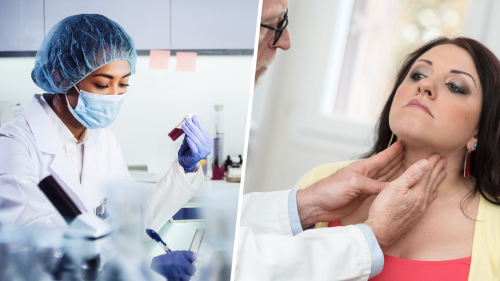
Millions of people have thyroid glands that don’t make enough thyroid hormone to meet their body’s needs. Hypothyroidism, also called underactive thyroid, is the most common reason some people need thyroid hormone replacement.
Hypothyroidism is treated by replacing the hormones that your own thyroid can no longer make. Thyroid hormone medicines mimic these hormones.
Thyroid hormone has been used as medicine for decades. The first versions of thyroid hormone medicines were made from the thyroid glands of pigs or cows & are not approved by the U.S. Food & Drug Administration. Today, there are modern, synthetic (laboratory-made) medications approved by the FDA. Most patients with hypothyroidism use these modern thyroid replacement drugs.
Some people still use unapproved products made from animal sources. The FDA has been encouraging manufacturers of unapproved medicines to apply for FDA approval, as required by law. This is in patients’ interest. The FDA’s drug approval process helps ensure that medications are safe & effective for their intended use. Unapproved medicines pose risks because the FDA has not reviewed them for safety, effectiveness, or quality before they are sold to patients.
The Role of the Thyroid
The thyroid is a small gland in the front of your neck that controls your metabolism. The thyroid produces thyroid hormones, which control many activities in your body, including how fast you burn calories.
Thyroid diseases cause this gland to make too much or too little of the hormone. Depending on how much or how little hormone your thyroid makes, you may often feel restless or tired, or you may lose or gain weight. Women are more likely than men to have thyroid diseases, especially right after pregnancy & after menopause.
The most common cause of hypothyroidism in the U.S. is Hashimoto’s disease. In people with Hashimoto’s disease, their immune system mistakenly attacks the thyroid & damages it. Hypothyroidism also can be caused by:
- Hyperthyroidism treatment (radioiodine).
- Radiation treatment of certain cancers.
- Thyroid removal.
Your health care provider might prescribe thyroid hormone therapy for other conditions & reasons, such as:
- To control the growth of the enlarged thyroid gland (also called goiter).
- To control the growth of nodules on the thyroid gland.
- For treatment after the removal of the thyroid for cancerous or noncancerous disease.
- After treatment of hyperthyroidism by radioactive iodine ablation.
Types of Thyroid Hormone Replacement Treatments
There are two types of thyroid replacement medicines. These medicines are available by prescription only.
The first type of therapy is synthetic medicine containing only levothyroxine. FDA-approved levothyroxine is available from several manufacturers.
The second type of therapy is made from dried ground thyroid glands from pigs. This is called desiccated thyroid extract (DTE), which is sold in the United States as Armour Thyroid, NP Thyroid, Nature-Throid, & Natural Thyroid, among other names.
Differences in Manufacturing, Quality, & Effectiveness
There are important differences between these two types of therapies. For one, the FDA has approved medicines containing levothyroxine, but the agency has not approved medicines containing DTE. FDA-approved medicines must first undergo a rigorous evaluation of safety, quality, & effectiveness.
Another big difference is in the manufacturing process. Laboratory-made levothyroxine can be consistently manufactured to make sure each tablet contains the correct amount of thyroid hormones. This is important because the body is very sensitive to tiny variations in thyroid hormone levels. Just a little too much medication can cause bad side effects, & just a tad too little can be ineffective.
Manufacturing DTE from pig glands tends to be a more complex process, & may result in safety, effectiveness, & quality issues because of inconsistent & inaccurate doses. For example, pills made from the same batches at the same manufacturing facilities may not always have the same hormone levels. This inconsistent dosage can make people sick. It can also result in voluntary drug recalls.
Manufacturing & quality issues, drug recalls, & supply issues are common with medicines containing DTE. As a result, the FDA has received many inquiries & complaints about the supply of medicines containing DTE & problems with patients receiving too much or too little medication.
Every patient’s therapy is different. Finding the best therapy for you may take time, & changing your thyroid medication is not an easy decision. FDA-approved treatment options can provide consistent, & precise dosing & the American Thyroid Association’s treatment guidelines recommend levothyroxine as the standard of care for hypothyroidism. We encourage patients to talk to their health care providers.
Source: FDA Consumer Updates

